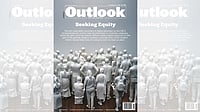THE early '90s euphoria over the entry of global auto majors into the country is history. There was a period when every day, either a new joint venture (JV) or the decision of some automobile giant to set up shop with a fully-owned plant in India would hog headlines. Hindustan Motors signed two JVs: with General Motors and Mitsubishi. Premier Automobiles tied up with Fiat and Peugeot. Mahindra & Mahindra (M&M) teamed up with Ford, Tatas with Mercedes-Benz, DCM with Daewoo. Hyundai got in with a wholly-owned subsidiary.
In three years, everything seems to have fallen apart. Most JVs are in trouble. With DCM unable to put up its share of the money for DCM Daewoo, its stake in the company has fallen to a paltry 1.6 per cent. Within three years, Daewoo's stake is up from 51 per cent to 92. DCM Daewoo is now called Daewoo Motors (India) Ltd, the smoothest takeover in Indian corporate history. Premier Automobiles reneged on its agreement with Peugeot and tied up with Fiat. The matter ended up in court, and Peugeot pulled out of the company. Mercedes-Benz has upped its stake from 51 to 75 per cent in its JV with the Tatas. At Mahindra Ford India Ltd (MFIL), M&M has agreed to allow Ford to hike its stake from the present 50 per cent to nearly 80 over the next four years. In return, M&M will get technology from Ford, and use of its testing facilities. But the truth remains that within a few years, all the new car companies have come under the full control of the foreign partners, bringing little prosperity to the Indian partner.
Neither have the MNCs prospered. For, while JVs collapsed, the market died. Daewoo had to slash prices by 25 per cent to up sales. The Fiat Uno bombed, the Peugeot 309 sank without a trace. MNCs misread the market potential, especially in Rs 4-lakh plus cars, and woke up one day to find that what was seen as undercapacity a few months ago, was suddenly a glut.
What about the other prosperity foreign investment was supposed to bring, a ripple effect leading to Indian auto ancillary companies doing well? Says John G. Parker, managing director, MFIL: "We're involved in an aggressive vendor development programme as we plan to launch our next car at the Maraimalai Nagar plant in Tamil Nadu with 70 per cent local content." Local suppliers, however, disagree. They assert that most of these vendors MNCs refer to are their own subsidiaries and not really Indian companies. Indian auto component manufacturers will close 1997-98 with a negative 15 per cent growth rate against a positive 20 per cent last year. To survive, manufacturers have cut production by 30-50 per cent, reduced prices in the replacement market, extended longer credit periods in the original equipment (OE) market and shifted focus to exports.
"Exports are being attempted but it's not a long-term solution. A pick-up has to happen in the domestic market. The industry is in bad shape," says K. Mahesh, spokesperson of the Auto Component Manufacturers Association (ACMA) and chairman and managing director of Sundaram Brake Linings. Anyway, exports are almost entirely to replacement markets where realisations are not too good. As per an ACMA survey, only 38 per cent of component makers are utilising more than 80 per cent of the installed capacity.
The insistence of foreign car majors to buy components from their vendors has resulted in a spate of JVs which does not benefit the existing business, feel Indian auto parts makers. According to analysts, future business is likely to go to these JVs. "The promoters will benefit since they have a stake in these ventures but it will hardly benefit the general investing fraternity," feels an analyst. As of now, there's no silver lining in sight.


























